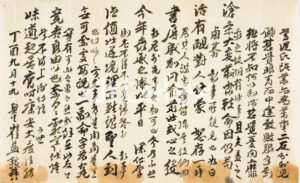Choi Ik-hyun (1833 – 1906) was a Confucian scholar and civil official during the late Joseon Dynasty.
Born in Pocheon, Gyeonggi Province, Choi studied Confucianism from an early age and deepened his knowledge under the guidance of Yi Hang-ro, a well-known Confucian scholar. In 1855, during the 6th year of King Cheoljong’s reign, he passed the state civil service exam (mungwa) and was appointed to various official posts, including at the Royal Secretariat and the Ministry of Personnel.
In 1905, following the signing of the Eulsa Treaty, which made Korea a protectorate of Japan, Choi was deeply outraged. He raised an army of righteous volunteers (*uibyung*) to resist Japanese encroachment. At the age of 74, he led an armed resistance movement from Namwon, only to be captured by Japanese forces and sent into exile on Tsushima Island.
During his exile, Choi resisted the Japanese authorities’ demands to adopt Western customs and refused to follow their orders, eventually leading him to declare a hunger strike. He refused to eat Japanese food, stating that he could not live on the food of the enemy while his country was being destroyed. Despite receiving medical care, Choi passed away due to illness exacerbated by his advanced age and the hardships of exile.
Choi Ik-hyun’s body was transported back to Korea and buried in Yesan, South Chungcheong Province. His death became a symbol of resistance, and many mourned his passing. The Korean government later honored him with the Order of Merit for National Foundation (Republic of Korea Medal) in recognition of his fight for national independence.
Although a conservative figure with feudal views, Choi Ik-hyun is remembered as a Confucian scholar and righteous leader who dedicated his life to defending his country against foreign domination and fighting for Korea’s independence.
–

